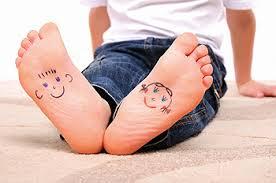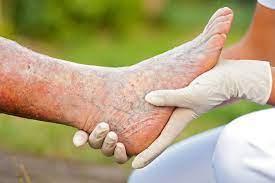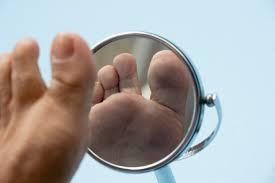Geriatric foot care is an important aspect of podiatry, as the aging process can bring about various changes that impact foot health and overall well-being in older individuals. As people age, they may experience a range of foot-related issues that require specialized attention and care. Here’s a discussion on the geriatric foot in podiatry:
Foot Changes with Age:
- Loss of Fat Pad: The natural cushioning fat pad on the sole of the foot can thin over time, leading to reduced shock absorption and discomfort when walking or standing.
- Arthritis and Joint Changes: Osteoarthritis and other forms of arthritis become more common in older adults, leading to joint pain, stiffness, and reduced mobility in the feet and ankles.
- Circulation Issues: Aging can impact circulation, leading to a higher risk of reduced blood flow to the feet. This can slow down the healing process and increase the risk of infections.
- Skin Changes: Skin becomes thinner and drier with age, increasing the risk of cracks, calluses, and other skin issues. Decreased sensation can make it harder to detect injuries or wounds.
- Reduced Muscle Strength: Muscle strength and flexibility tend to decrease with age, affecting gait and balance, which can contribute to falls.
Common Geriatric Foot Conditions:
- Corns and Calluses: Reduced cushioning and increased pressure can lead to the formation of corns and calluses, which can be painful and increase the risk of skin breakdown.
- Bunions and Hammertoes: Structural changes in the foot can lead to deformities like bunions and hammertoes, which can cause pain and difficulty finding comfortable shoes.
- Diabetic Foot Care: Older adults with diabetes need careful foot care to prevent complications like ulcers and infections due to reduced circulation and sensation.
- Peripheral Neuropathy: Neuropathy, common in older adults, can lead to numbness, tingling, and loss of sensation in the feet, increasing the risk of injuries going unnoticed.
- Fall Prevention: Foot problems can contribute to balance issues and falls, which are a major concern in the elderly population.
Importance of Geriatric Foot Care:
Foot health becomes increasingly important as individuals age. Here are some essential pieces of foot health advice for geriatric patients:
- Daily Foot Inspection: Check your feet daily for any cuts, blisters, redness, swelling, or other abnormalities. Early detection of issues can prevent them from worsening.
- Proper Hygiene: Wash your feet daily with mild soap and lukewarm water. Dry them thoroughly, including between the toes, to prevent fungal infections.
- Moisturize: Apply a moisturizer to your feet to prevent dry and cracked skin. Avoid applying moisturizer between the toes, as excess moisture can lead to fungal growth.
- Trim Nails Carefully: Trim your toenails straight across, without rounding the edges, to prevent ingrown toenails. If you can’t do it safely yourself, seek professional help.
- Appropriate Footwear: Wear comfortable shoes that provide proper support and cushioning. Avoid high heels, pointed toes, and shoes that are too tight.
- Foot Comfort: Choose shoes with a wide toe box to prevent pressure on the toes. Make sure your shoes fit well and don’t cause friction or discomfort.
- Orthotic Inserts: If recommended by a podiatrist, consider using orthotic inserts to provide additional support and improve your gait.
- Regular Exercise: Engage in low-impact exercises to maintain circulation, strength, and flexibility in the feet. Activities like walking and gentle stretching can be beneficial.
- Elevate Your Feet: When sitting, elevate your feet to reduce swelling. This can also improve blood circulation.
- Stay Hydrated: Drink plenty of water to maintain overall hydration, which can help prevent foot swelling.
- Manage Chronic Conditions: If you have diabetes, arthritis, or other chronic conditions, work closely with your healthcare team to manage them effectively and prevent foot complications.
- Monitor Foot Sensation: Pay attention to any changes in sensation, tingling, or numbness in your feet. If you have reduced sensation, be cautious to avoid injuries.
- Regular Checkups: Schedule regular visits to a podiatrist for foot health assessments, especially if you notice any changes or discomfort.
- Foot Elevation: Elevate your feet whenever possible to help reduce swelling and improve circulation.
- Fall Prevention: Keep pathways clear of obstacles, wear shoes with good traction, and consider using assistive devices if needed to reduce the risk of falls.
- Avoid Self-Treatment: Avoid using over-the-counter treatments for foot issues without consulting a healthcare professional, as they can worsen problems.
- Avoid Smoking: Smoking can decrease blood circulation and hinder the body’s natural healing processes.
- Seek Prompt Care: If you notice any changes, pain, or issues with your feet, seek medical attention promptly to prevent complications.
Remember that each person’s foot health needs are unique. Consulting a podiatrist for personalized advice and regular checkups is crucial to maintaining optimal foot health as you age. By following these guidelines and staying proactive about your foot care, you can promote your overall well-being and enjoy a more active and comfortable life in your senior years.
Share this post:





